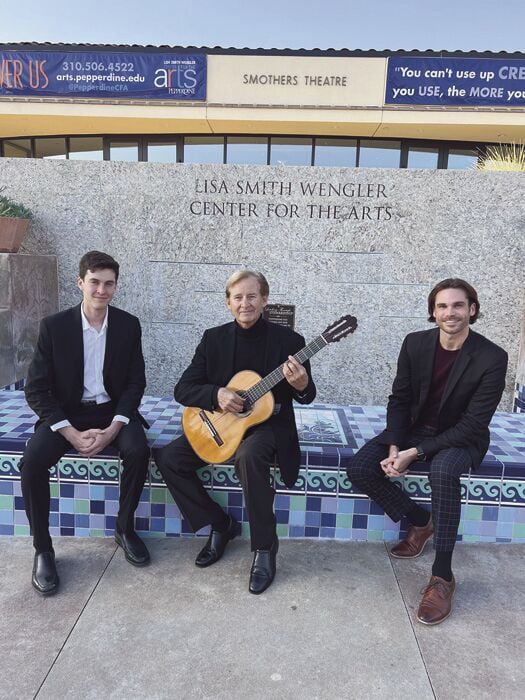
In a rustic bungalow behind Cosentino’s Nursery on Pacific Coast Highway you may find Fred Walecki quietly doing what he loves—repairing guitars and other stringed instruments. The luthier who’s been in the music business for more than five decades does not have a sign above his shop.
“Those who know, know,” he said. And those who seek Walecki’s expertise in stringed instruments are very often famous faces in the music business. The Malibu resident of more than 30 years has been in the music business his entire life.
For years, Walecki ran the storied Westwood Music, originally opened by his father Hermann Walecki in 1947. The store quickly became a haven for celebrated musicians like Ella Fitzgerald, The Beach Boys, The Rolling Stones, Frank Sinatra and countless other top musical entertainers. Many became friends with the family. Fretboard Magazine once called the shop a “social club.”
As Fred carried on his father’s legacy, he became close to some of the biggest rock and folk musicians of the 1970s.
Walecki is so beloved in the music community that when he was stricken with throat cancer 20 years ago his singer-songwriter friends held benefit concerts in support. It was an epic two nights of performances that brought an impromptu reunion of three original members of The Byrds who hadn’t played live together since their induction into the Rock & Roll Hall of Fame. Jackson Browne, members of The Eagles, Warren Zevon and Spinal Tap are just some of the rock stars who performed.
One of Walecki’s friendships is with superstar Linda Ronstadt. The Grammy winner’s aunt had once studied opera in Spain and acquired a most rare instrument—a 19th century Antonio de Torres guitar. Torres guitars are known for their construction and, Walecki stated, “I believe it’s the one he used to try different bracing,” which would make the historical instrument dated 1856 even more valuable. “It’s a spectacular concert guitar.”
The extremely rare Torres was passed along to Ronstadt’s brother Michael, who eventually asked his trusted friend Walecki to sell it. The instrument sold for six figures some 30 years ago. That buyer recently returned to the musical instrument expert to sell it again. However, Walecki won’t just sell off the museum quality piece—he intends to find it the proper home it deserves.
Currently, the Torres guitar is safely secured in a bank vault. But some musical instruments yearn to be played. So Walecki decided to surprise his friends at the classical guitar department of Pepperdine University, headed by the world-renowned Christopher Parkening, whom Walecki called “the greatest American guitar player—maybe the world’s greatest.”
In November, the luthier entrusted a Pepperdine guitar student to bring the Torres to a master class taught by Parkening.
“I needed to have some fun with this because this guitar is unimaginable to someone like Christopher Parkening,” Walecki reflected.
“It was a spectacular treat,” said Kevin Enstrom, lead adjunct of guitar at Pepperdine. Over the summer, Enstrom taught a guitar history course. “All the guys and girls who took my course learned all about these ancient instruments and learned about bracing. We thought it would be interesting to see an instrument we talked about in class.” Not only did the seven students and their professors look at the extraordinary guitar—they were all given the opportunity to play it.
“They were blown away,” Enstrom said. “I don’t think they’ve had anything so old in their hands, let alone so priceless. They were holding a piece of history.”
“What makes it so special is that allegedly that instrument is what Torres based his bracing off of. Torres guitars are known for very specific bracing of the sound board that allows the instrument to resonate. It’s the Stradivarius of guitars,” Enstrom explained. The guitar also has a cedar wood soundboard, rather than spruce, which is a rarity for a Torres. The professor described the instrument’s sound quality as “robust, with a vast color palette. Each note can sound like a trumpet or as warm as a violin. That stood out on this legendary instrument.”
“Fred has worked on all of our guitars at some point in our lives. The good thing about Malibu and Pepperdine is you never know what can find its way to the program. With Professor Parkening having such an amazing career we get these opportunities sometimes,” Enstrom observed.
